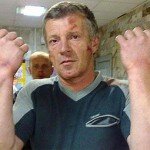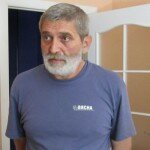
A former political prisoner and former activist of the Young Front, a member of the Belarusian Christian Democracy Vadim Kabanchuk gave an interview to Palitviazni.info.
– Please, tell about your case, which was initiated for political reasons.
-The investigation against me was initiated for taking part in mass actions that took place in the spring of 1997. That was when there were two or three such mass actions. For half a year I was wanted. At that time I was studying at the Polytechnic, I was not aware that the authorities put me on a wanted list. I was arrested in October 1997, after completing the studies. It happened also during the one of the public events – I was detained during the march.
I was charged under two articles, the mass riots and the second – resisting a militia officer. In 1997, there were many similar cases. I spent six months in the Volodarka prison before the trial. I was sentenced to three years of suspended sentence. It was a long time ago.
– What can you say about the prison conditions?
-At that time, it was still a typical Soviet prison-after all it was 1997. Now, conditions vary considerably. They are even a little better – if we talk about ordinary prisoners. But now they exert pressure on political prisoners to write applications for clemency. At a time when I was a prisoner, there was no such thing.
– And the administration did not exert pressure through some of its secret collaborators or other prisoners?
– No. One just runs a life in a closed cell, which is difficult enough. But of course the authorities placed their undercover employees in cells. But it is a normal thing. I personally was not treated in any special way. I was an ordinary prisoner.
– You say that conditions in prisons have improved, but not for political prisoners. Autukhovich revealed recently that the authorities exert strong pressure on him.That he was put into a solitary confinement several times and every times for several days.
– Yes, the conditions has improved for ordinary prisoners. In 1997, we had a permission to receive small packages, 8 kg every month.We were also not allowed to write and receive letters. Now it is allowed. The living conditions in detention have changed.
– And what about prison food. Was it eatable?
– It was terrible. Bad bread, all these soups, simply terrible. Of course, we did not receive neither meat nor fish. But we were given something like fish soup – it was a substance in which there were scales of fish.
– Would it be possible to maintain good health on this prison food without receiving food packages?
– I do not think so. We were sharing everything. When they gave us a porridge we added to it something from our packages.
– Was it possible to go on strolls?
– Once a day. But I preferred to sleep at that time. If one wanted, one went for a 40-50 minutes’ walk to a small backyard and was walking around it.
– What steps must be taken by the society in Belarus and the international community to release political prisoners as soon as possible?
– I am very skeptical about the European community. It seems to me that they know about our Belarusian problems very little (that there are few political prisoners), and in the face of events in Syria, where tens of thousands of people are being killed, they are not particularly worried about Belarus. It seems to me that the regime will take some pragmatic steps in order to get or something. It all depends on whether or not the trade with the IMF, etc. will be maintained.
If you talk about civil society. We are in the ghetto now. In fact, we are not subject to politics today. We have regime, there is Russia, perhaps to some extent Europe or the USA. Belarusian opposition and civil society are no longer a subject of politics.
The most effective is information. The authorities fear, of course, when information is leaking. The information about what is happening in prisons is crucial. Each violent action, each provocation should go public. It’s working and limits the authorities in such activities.




